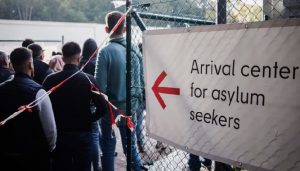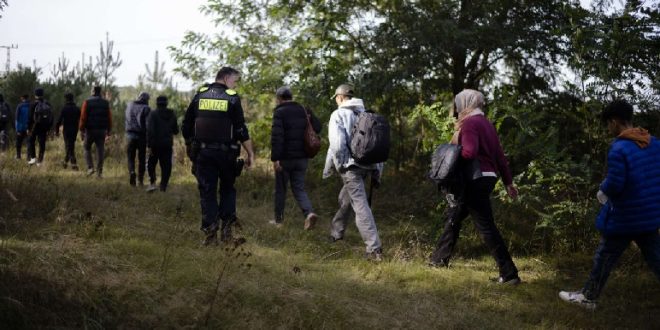24-09-2024
BERLIN: On Sunday, voters in the eastern German state of Brandenburg will vote for a new regional parliament. The anti-migrant far-right Alternative for Germany, or AfD, could win the most votes. On 1 September the AfD won a major German election for the first time, coming first in the eastern state of Thuringia. In Brandenburg polls show the AfD leading with 28%.
 To undermine support for the AfD, Chancellor Olaf Scholz’s left wing-led government on Monday introduced checks for migrants on all of Germany’s borders. He also wants to increase deportations of people whose application for asylum is unsuccessful. Opposition conservatives meanwhile want the borders closed to asylum seekers altogether.
To undermine support for the AfD, Chancellor Olaf Scholz’s left wing-led government on Monday introduced checks for migrants on all of Germany’s borders. He also wants to increase deportations of people whose application for asylum is unsuccessful. Opposition conservatives meanwhile want the borders closed to asylum seekers altogether.
This is a very different country to the Germany of Angela Merkel. Almost a decade ago the then-chancellor refused to shut the borders to hundreds of thousands of people fleeing war and persecution in Syria and Afghanistan. “Wir schaffen das”, or “We can do it”, she famously said.
In 2015 and 2016 Germany took in around 1.5 million refugees and migrants, mostly from the Middle East. They were greeted at train stations with signs saying “welcome” and smiling volunteers handing out food and toys. A new German word was invented, “Willkommenskultur” or “welcome culture”, and many Germans were suddenly proud of the country’s new-found identity as a safe haven for refugees.
Yesterday, many of those refugees are becoming German themselves. A record 200,000 people became German citizens in 2023. The largest group came from Syria. These are the New Germans.
The “2015 generation” is described as highly motivated by experts. Many could have stayed in Lebanon and Turkey, but pushed themselves on to Germany to make a new life. They are on average younger than the native-born population, 26 years old compared to the German average of 47 and statistically more likely to be in work: 84% of the Syrian men who arrived in 2015 are in employment, compared to 81% of German-born men but with the rise of the AfD and an ever harsher tone towards migrants in mainstream politics, the 2015 “welcome culture” is hard to find today.
 Fewer refugees are now coming to Germany, with new arrivals down this year by 22% compared to the same period in 2023 but overall 3.48 million refugees are now living in the country more than at any time since the 1950s. A third are from Ukraine.
Fewer refugees are now coming to Germany, with new arrivals down this year by 22% compared to the same period in 2023 but overall 3.48 million refugees are now living in the country more than at any time since the 1950s. A third are from Ukraine.
Some local councils say they are struggling to cope logistically and financially. Right-wingers and the AfD say numbers are too high. Left-wingers blame the finance ministry’s obsession with balancing the books and refusal to take on new debt. Add that to an enormous boost in military spending after Russia’s full invasion of Ukraine, and there is a nervousness in Germany that money and resources are tight. Chancellor Olaf Scholz’s argumentative and divided coalition government has not helped voters feel more secure in the country’s leadership.
So how do the New Germans feel about this shift in mood in Germany?
Parvin was one of those who arrived in 2015, travelling for months, mostly walking, from Afghanistan to Germany with her three-year old son and disabled nephew. They were shot at by border guards and she feared for her life when the overcrowded dinghy they were in starting sinking in the Mediterranean.
She has now just received her German citizenship and this summer qualified as a social worker. A refugee success story, you might think but she says the atmosphere has got worse for migrants since 2015. “I don’t feel welcome here,” she tells me.
“The rise of the far right and the hate towards refugees is mostly because of the bad picture of refugees in German media,” she says. (Int’l News Desk)
 Pressmediaofindia
Pressmediaofindia




